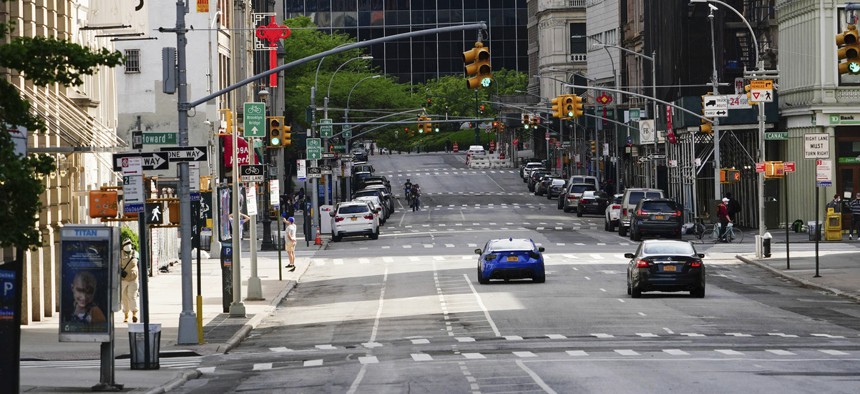New York City Begins Methadone Delivery Service for People with Addictions

The New York City Health Department estimates that their team will make 1,300 methadone home deliveries per month. John Nacion/AP

Connecting state and local government leaders
The city's health department will make the delivery option available to some patients, such as older people or those with health conditions like diabetes who are particularly vulnerable to developing serious cases of Covid-19.
In New York City, one of the world’s leading hotspots for coronavirus cases, people taking methadone to help them overcome opioid addictions still needed to venture out to a clinic to get the medication.
That’s despite the fact that people with substance abuse disorders, including past use of opioids, may be at a higher risk for developing serious complications if they catch Covid-19.
But now the city’s health department is embracing a different option for some people using the synthetic opioid to aid recovery.
In a first, the department, in collaboration with the New York State Office of Addiction Services and Supports, will deliver methadone to the homes of patients who have coronavirus, suspect they might have the virus, or fall into another category of high-risk individuals, like the elderly or those with chronic health conditions.
Methadone helps curb cravings and eases the withdrawal symptoms experienced by people getting off opioids without producing a high. It is often used as part of a broader treatment program. U.S. Health and Human Services Secretary Alex Azar in 2018 noted that attempting to treat opioid dependence without the use of medication-assisted treatment like methadone is “like trying to treat an infection without antibiotics.”
The drug is strictly regulated by the federal government, requiring a patient to visit a treatment center regularly, usually once a day, to get their doses. But in March, the U.S. Substance Abuse and Mental Health Services Administration issued new guidance that loosened restrictions on methadone, allowing “stable” patients—those who have shown they are able to keep up with a consistent treatment plan—to receive up to 28 days’ worth of doses. New patients can get 14 days’ worth.
While not all cities and states have made changes to adjust to the new guidelines, New York City implemented this change and took it a step further for certain patients. In mid-April, the health department piloted methadone delivery at isolation hotels for homeless residents of the city who had tested positive for Covid-19 or were exposed to someone who had tested positive.
Now, home delivery will be available to a much greater number of the roughly 28,500 methadone patients registered with the city’s 68 opioid treatment programs. Working in teams of two and equipped with masks and wipes, couriers will make approximately 1,300 curbside deliveries per month, according to health department estimates.
Anyone who takes methadone can be referred for delivery by their treatment coordinator if they have a positive diagnosis or Covid-19 symptoms. The city suggests that all patients over 50 years old who have an underlying health condition, including lung disease, heart disease, diabetes, or cancer, also be referred for home delivery (more than half of New Yorkers on methadone are over 45 years old). Patients can also now assign a family member to pick up their methadone for them for any reason.
New York City Health Commissioner Dr. Oxiris Barbot said that the new program will be “life-saving.”
“New Yorkers who take methadone and get sick from Covid-19 should not have to choose between getting their medication and protecting their health or the health of others,” she said in a statement. “No other medication is as strictly regulated as methadone, and I urge my federal colleagues to consider making these changes permanent after the pandemic is over.”
Not all city officials approved of the program. Some, including Queens Councilmember Robert Holden, raised concerns that those in isolation don’t have nurses or medical staff to check on them, which could increase the chance of overdoses or lapses in recovery. Holden told the New York Post that “while good intentioned,” the program was still “an experiment” that shouldn’t continue in the long term. “The point of a methadone clinic is that there are qualified aides who ensure that patients take the medicine on a daily basis,” he said. “I don’t see how this could be replicated on a delivery basis.”
Others would already like to see the program expanded. Charles King, the CEO of Housing Works, a nonprofit focusing on AIDS and homelessness, said in a statement that he would like to see the city “ensure that these folks have access to additional harm reduction resources, such as clean syringes.”
For now, opioid treatment providers, many of whom feared that the pandemic would derail recovery programs that have been instrumental in fighting the opioid epidemic, say they are pleased the city responded so quickly. Allegra Schorr, the president of the Coalition of Medication Assisted Treatment Providers and Advocates of New York State, said in a statement that the program has been a “vital support” while they work to maintain patients’ health. “This will help our opioid treatment programs continue to battle the crisis of opioid addiction and overdose while simultaneously acting to protect personal and public health during the COVID threat,” she said.
Emma Coleman is the assistant editor for Route Fifty.

NEXT STORY: Bots, voice assistants help states manage COVID’s downstream effects





